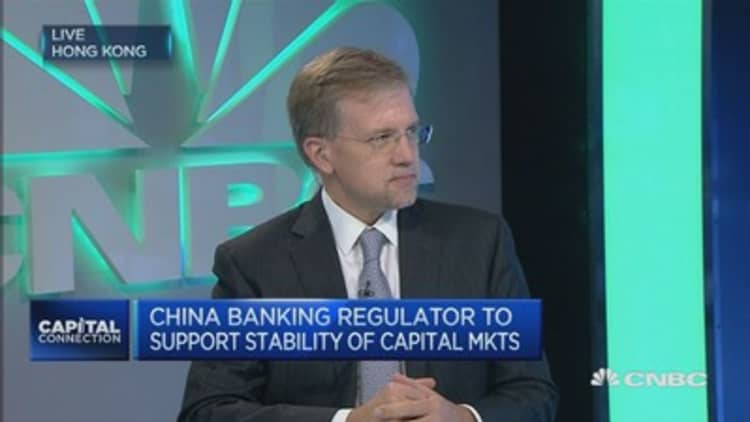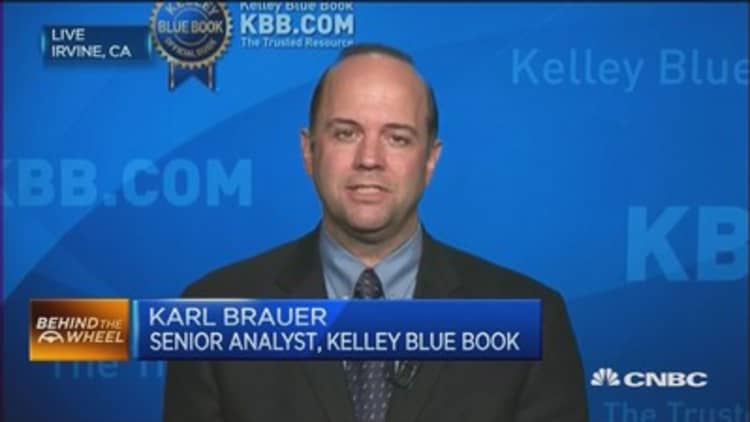Asian shares largely staged a turnaround late Thursday, as Chinese markets regained their footing on the back of fresh regulatory support.
The country's banking regulator said Thursday it will use a series of measures to support the stability of the capital markets, such as encourage interbank lending between the country's margin lender and banks, while permitting financial institutions to renegotiate maturity terms.
Authorities also took the drastic step of ordering shareholders with stakes of more than 5 percent from selling shares for the next six months late Wednesday. In addition, Beijing eased rules for insurers to invest in blue-chips stocks, raised margin requirements for short positions against small-cap stocks and warned against "irrational selling", among other initiatives.
According to Francis Cheung, head of China & HK Strategy at CLSA, the unprecedented emergency measures may be working.
"This may be the beginning of the end of China's correction, with the government buying the market and will likely continue buying until the markets stabilized. Of course, [a reverse in sentiment] is not going to happen overnight. With the market still relatively expensive and people wanting to sell still, downside remains in the A-share market at this level," Cheung told CNBC on Thursday.
Analysts at Deutsche Bank also expect mainland shares to see a technical rebound this week, with a "policy put" in play and commitment from the central government "which implies even stronger policy support if what has been announced proves insufficient," analysts wrote in a note.
However, with more than half of the listed companies in China's market suspended from trading, investors whose cash are locked up in these suspended stocks remain spooked.
"[Beijing is] trying to backstop this, but one of the problem is having 13,000 companies suspended from trading and that makes life difficult for sellers and this had led to the spillover in the region," Herald Van Der Linde, HSBC's APAC head of equity strategy, told CNBC Asia's "Squawk Box." "In the near term, sentiment doesn't look very good."
Overnight, major U.S. indexes ended nearly 2 percent lower as the New York Stock Exchange suffered a nearly four hour outage.
Mainland markets rebound
The relentless selloff which has wiped out more than 30 percent from June 12's closing peak seemingly abated on Thursday, with China's benchmark Shanghai Composite index ending up 6 percent at 3,710, after touching a session-low of 3,373 in the morning.
Elsewhere in the world's second-biggest economy, the CSI 300 index pared early declines to climb 6.4 percent, while the Shenzhen Composite advanced 3.8 percent.
Gainers were led by property heavyweights, with China Vanke and Poly Real Estate climbing the daily maximum allowable of 10 percent each. Securities firms such as Citic Securities and Haitong Securities which bore the brunt of the recent mayhem also rose by the daily limit.
To be sure, there are analysts who remain cautious about the market. "Fundamentally, China is coming back to a point of attraction – the monstrous P/E ratios have come back to more realistic levels. However, the bursting bubble means value is unlikely to factor into thinking in the interim so the repercussions haven't completely played out yet," IG market strategist Evan Lucas, who described the selloff in the previous session as a "Black Wednesday," said in a note Thursday.
Hong Kong's Hang Seng index took a breather following Wednesday's meltdown. The bourse surged 4.1 percent, shrugging off concerns from intensifying global uncertainties and negative drags from A-shares.
On the domestic data front, consumer price index (CPI) rising 1.4 percent in June from a year earlier, slightly above market forecasts. However, the producer price index (PPI) remained in deflationary territory with a greater–than-expected slide of 4.8 percent, compared with a 4.6 percent decline in May. This marks its 39th consecutive month of declines, according to Reuters.

Nikkei gains 0.6%
Japan's Nikkei 225 turned positive in the final hour of trade, helped by the share price rebound in China, but remained below the key 20,000 mark. On Wednesday, the Tokyo index settled below the psychological level for the first time in seven weeks.
Companies with high exposure to the mainland enjoyed a reprieve in the afternoon session; Komatsu bounced up 1.6 percent, while Hitachi Construction Machinery closed up 0.4 percent.
The outperformer for the day was Fast Retailing which soared more than 4 percent. After the market close, the owner of clothes brand Uniqlo reported a 36 percent rise in nine-month profit.
Nissan Motor closed down 0.6 percent, a day after tumbling 6.6 percent following the company's announcement of an abnormal deployment of an airbag made by Takata. Meanwhile, Honda finished little changed on news that it is expanding a recall to replace the faulty airbags.
On the domestic data front, core machinery orders unexpectedly rose 0.6 percent in May, beating expectations for a 5.0 month-on-month decline and compared with April's gain of 3.8 percent.

ASX flat
Australia's S&P ASX 200 index finished little changed on the back of a temporary halt in China's market meltdown and a better-than-expected employment report which showed the economy adding 7,300 jobs in June. A poll by Reuters had expected a decline of 5,000 jobs.
Earlier in the session, the Sydney bourse fell below the 2014's close of 5,411 for the first time this year.
Similarly, the Australian dollar advanced 0.7 percent to $0.74891 against the greenback, compared to the six-year low of $0.7415 in the morning.
The mining sector underpinned the bourse's rebound; Fortescue Metals, which had slumped to a multi-year low in the morning, tacked on 6.6 percent while BHP Billiton and Rio Tinto gained more than 1 percent each.
However, financials stayed in the red, with Westpac and National Australia Bank down 0.8 and 0.6 percent, respectively.
Meanwhile, shares of Caltex sagged 1.4 percent despite the company saying its first-half earnings rose to $375 million for the six months to June 30, more than double the $163 million in the year-ago period.
Kospi up 0.6%
South Korea's Kospi index bounced back from a near four-month low to snap a four-session losing streak.
Apart from a 2.1 percent jump in the top weighted stock Samsung Electronics, a broad-based recovery helped to hurl the index back above the flatline. Early laggards such as brokerage houses clawed back losses in the afternoon session, with Daewoo Securities piling on 4.6 percent.
However, Korean Air Line stayed firmly in the red by closing down 5.5 percent.
With the market's attention squarely on China, the Bank of Korea's (BOK) decision to keep its base rates unchanged at a record low of 1.5 percent, which was in line with expectations, did little to sway market sentiment.
Rest of Asia mixed
Tracking the rebound in the region, Taiwan shares trimmed losses to close down 0.7 percent, after plunging as much as 2.5 percent to hit a near seven-week trough intra-day.
In Southeast Asia, the Jakarta Composite index was the biggest loser with a more than 1 percent decline, while Singapore's Straits Times index, Thailand's SET index and Vietnamese shares eased modestly.
Meanwhile, Malaysia's FTSE Bursa Malaysia KLCI and the Philippines' PSEi eked out marginal gains.

